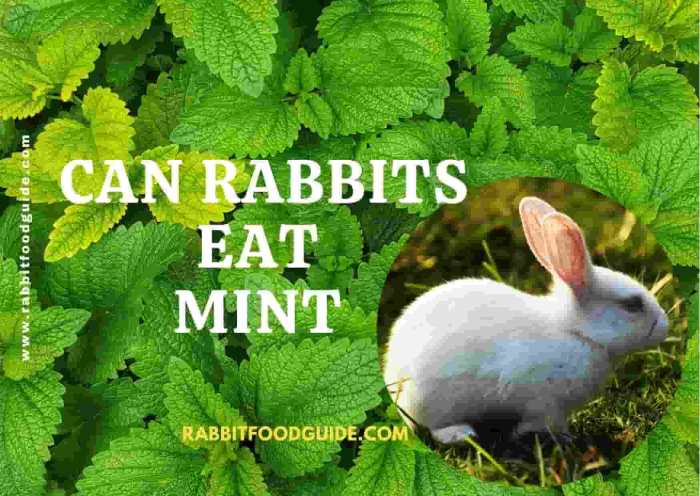Rabbits are known for their love of greens, but can they safely indulge in the refreshing taste of mint? This guide will explore the nutritional value of mint for rabbits, the different types of mint and their effects, safe consumption guidelines, potential risks, and alternative herbs to consider.
Whether you’re a seasoned rabbit owner or just curious about their dietary needs, this article will provide you with all the information you need to make informed decisions about feeding mint to your furry friend.
Mint, a member of the Lamiaceae family, encompasses a wide range of aromatic herbs, including peppermint, spearmint, and apple mint. These herbs are characterized by their distinct flavor and aroma, which are attributed to the presence of volatile oils such as menthol and menthone.
Nutritional Value of Mint for Rabbits

Mint leaves offer several essential nutrients for rabbits. They contain a rich source of fiber, aiding in digestive health and preventing gastrointestinal issues. Mint also provides vitamin C, crucial for immune function and overall well-being. Additionally, it contains antioxidants that help protect cells from damage caused by free radicals.
Health Benefits of Mint for Rabbits
Consuming mint in moderation can provide various health benefits for rabbits. The high fiber content promotes healthy digestion, reducing the risk of digestive problems such as diarrhea or constipation. The vitamin C content supports a robust immune system, enhancing the rabbit’s ability to fight off infections.
Furthermore, the antioxidants in mint protect cells from damage, contributing to overall health and well-being.
Types of Mint and Their Effects on Rabbits
Different varieties of mint have varying effects on rabbits. Some types are safe for rabbits to consume in moderation, while others can cause adverse reactions.
Spearmint
Spearmint is a common type of mint that is generally safe for rabbits to eat. It has a mild flavor and contains antioxidants that can support a healthy immune system. However, excessive consumption can lead to gastrointestinal upset.
Peppermint
Peppermint has a stronger flavor than spearmint and contains higher levels of menthol. While small amounts may be tolerated, large quantities can cause digestive issues and respiratory problems in rabbits.
Chocolate Mint
Chocolate mint is a hybrid of spearmint and peppermint. It has a sweet, chocolate-like flavor. However, like peppermint, it contains high levels of menthol and should be given to rabbits sparingly.
Pennyroyal
Pennyroyal is a type of mint that is toxic to rabbits. It contains a compound called pulegone, which can cause liver damage and other serious health problems.
Safe and Recommended Consumption Guidelines
While mint can be beneficial for rabbits in moderation, it is crucial to follow specific guidelines to ensure safe and optimal consumption.
To prevent digestive issues and other potential health concerns, limit mint intake to no more than twice a week . Each serving should be approximately one tablespoon of fresh mint leaves or a teaspoon of dried mint.
Frequency and Quantity
- Frequency: No more than twice a week.
- Quantity: One tablespoon of fresh mint leaves or one teaspoon of dried mint per serving.
Potential Risks and Side Effects
While mint offers several health benefits, it’s crucial to be aware of potential risks associated with its consumption for rabbits.
Excessive consumption of mint can lead to digestive issues in rabbits. The high fiber content can cause gas and bloating, particularly if the rabbit is not accustomed to eating fibrous foods. Additionally, the essential oils in mint may irritate the rabbit’s digestive tract, resulting in diarrhea or vomiting.
Gastrointestinal Distress
- Gas and bloating
- Diarrhea
- Vomiting
Other Concerns
In rare cases, rabbits may experience allergic reactions to mint. Symptoms of an allergic reaction include skin irritation, swelling, and difficulty breathing. If you notice any unusual symptoms after your rabbit consumes mint, discontinue its use and consult a veterinarian promptly.
Alternatives to Mint
Mint, while safe in moderation, should not be the primary herb in a rabbit’s diet. Consider introducing alternative herbs that offer similar benefits or provide complementary nutrients.
The following table compares the nutritional value and effects of mint to some suitable alternatives:
Nutritional Value and Effects Comparison
| Herb | Calories (per 100g) | Fiber (g) | Calcium (mg) | Vitamin C (mg) | Effects |
|---|---|---|---|---|---|
| Mint | 70 | 8.1 | 140 | 17.5 | Aromatic, digestive aid, anti-inflammatory |
| Basil | 23 | 1.6 | 102 | 17.4 | Antioxidant, anti-inflammatory, digestive aid |
| Cilantro | 23 | 2.1 | 153 | 24.1 | Antioxidant, anti-inflammatory, digestive aid |
| Parsley | 36 | 3.3 | 133 | 132.7 | Diuretic, antioxidant, high in vitamin C |
| Oregano | 27 | 2.2 | 156 | 16.5 | Antioxidant, anti-inflammatory, digestive aid |
Closing Summary
In conclusion, while mint can be a safe and beneficial treat for rabbits when consumed in moderation, it’s essential to exercise caution and follow the recommended guidelines to avoid any potential risks. By understanding the nutritional value, different types of mint, safe consumption practices, and potential side effects, you can ensure that your rabbit enjoys the occasional mint treat without compromising their health.
FAQ
Can rabbits eat all types of mint?
No, not all types of mint are safe for rabbits. Some varieties, such as pennyroyal and water mint, contain toxic compounds that can be harmful to rabbits.
How often can I feed mint to my rabbit?
Mint should be fed to rabbits sparingly, no more than once or twice a week, and in small quantities.
What are the potential risks of feeding mint to rabbits?
Excessive consumption of mint can lead to digestive upset, including diarrhea and gas. Additionally, some rabbits may be allergic to mint.
What are some alternative herbs that I can feed my rabbit?
Safe and beneficial alternatives to mint for rabbits include basil, cilantro, dill, and parsley.